
Jackson: Diverse judicial branch ‘bolsters public confidence in our system’

Jackson: A diverse judicial branch “bolsters public confidence in our system”
From CNN’s Tierney Sneed
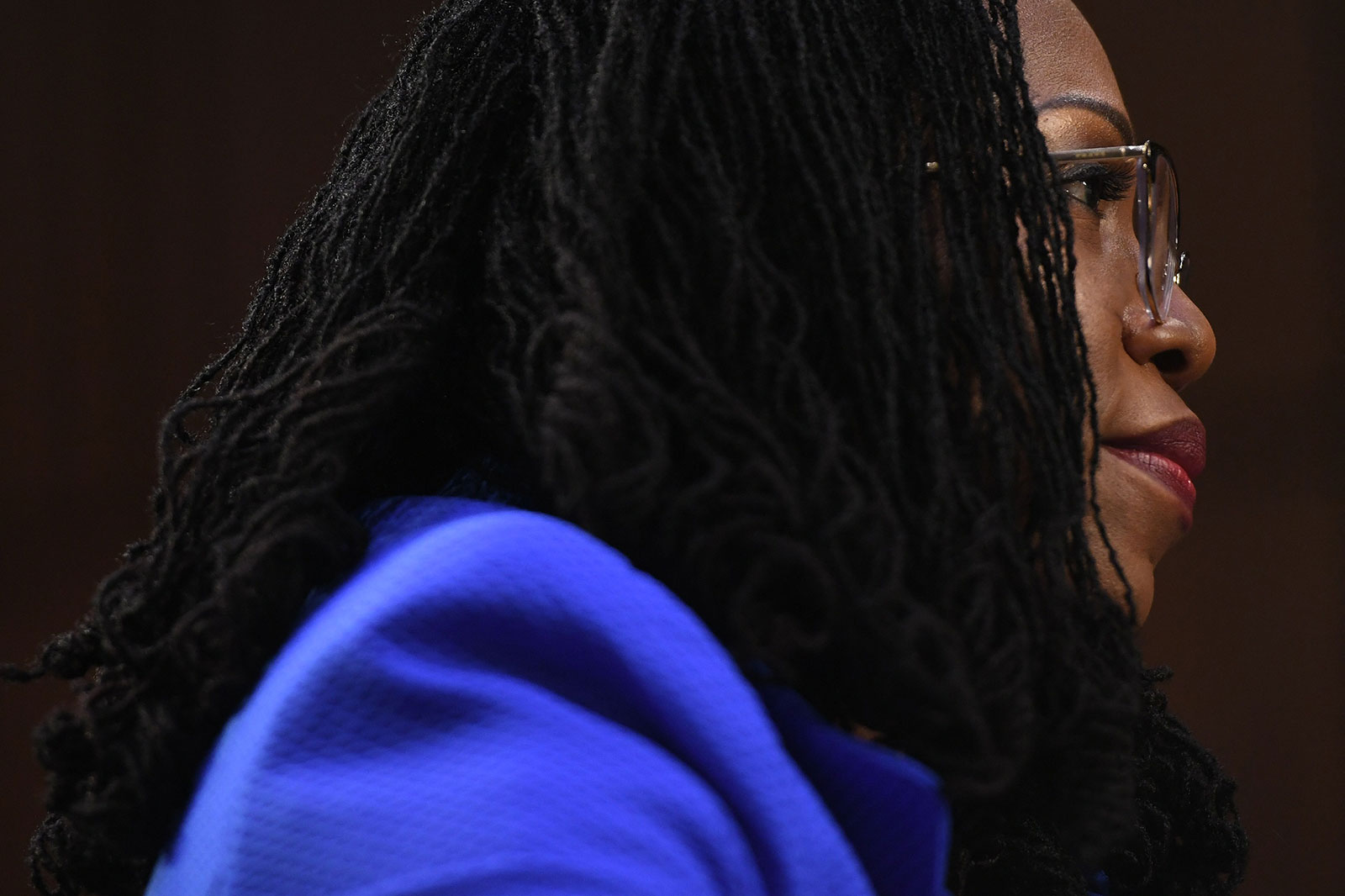
As the Senate weighs whether to make Judge Ketanji Brown Jackson the first Black female justice, she told the Judiciary Committee that a diverse judicial branch “lends and bolsters public confidence in our system.”
“We have a diverse society in the United States,” Jackson said. “There are people from all over who come to this great nation and make their lives and when people see that the judicial branch is comprised of a variety of people who are, have taken the oath to protect the Constitution and who are doing their best to interpret the laws consistent with that oath, it lends confidence that the rulings that the judge, that, that the court is handing down are fair and just, that everything has been considered, that no one is being excluded because of a characteristic like race or gender or anything else.”
She also discussed the impact diversity on the bench has on role-modeling.
“I have been so touched by the numbers of people who’ve reached out to me in this period of time, to say how much it has meant to their daughters, to their sons, to the next generation, that I’ve been appointed, to nominated and hopefully confirmed,” she said.
In a new Monmouth University survey, 69% of Americans say it’s at least somewhat important for the Supreme Court to look like the racial, ethnic and gender composition of the country as a whole, with 46% saying it’s very important. Read more here.
Jackson calls herself the “first generation to benefit from the civil rights movement”
From CNN’s Tierney Sneed
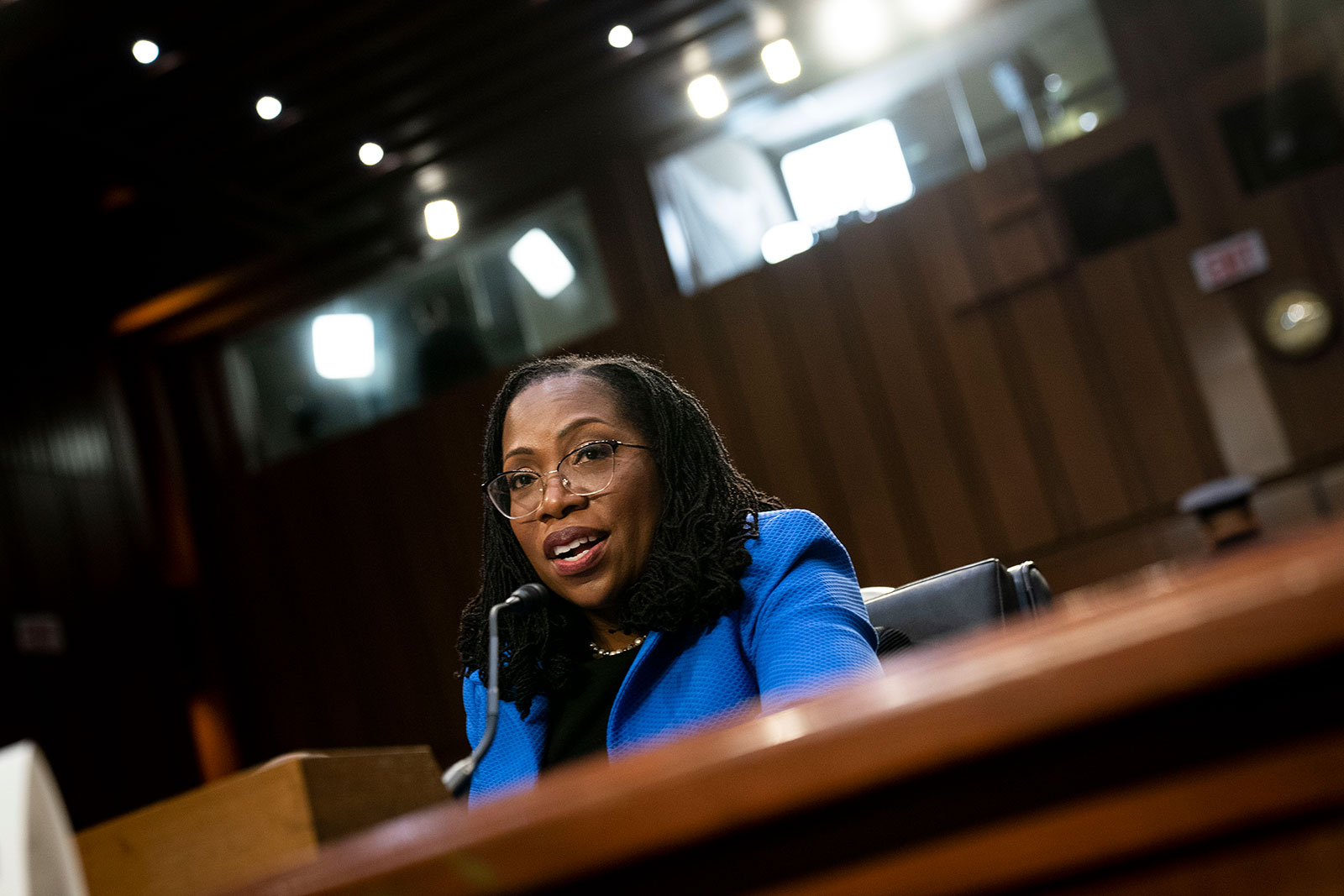
Judge Ketanji Brown Jackson recounted the childhood of parents, who attended segregated middle and high schools in Florida, and how her upbringing was like “night and day” to theirs.
“I do consider myself, having been born in 1970, to be the first generation to benefit from the civil rights movement, from the legacy of all of the work of so many people that went into changing the laws in this country so that people like me, could have an opportunity to be sitting here before you today,” she said.
Watch the moment here:
Here are key things to know about what happens next in the confirmation process
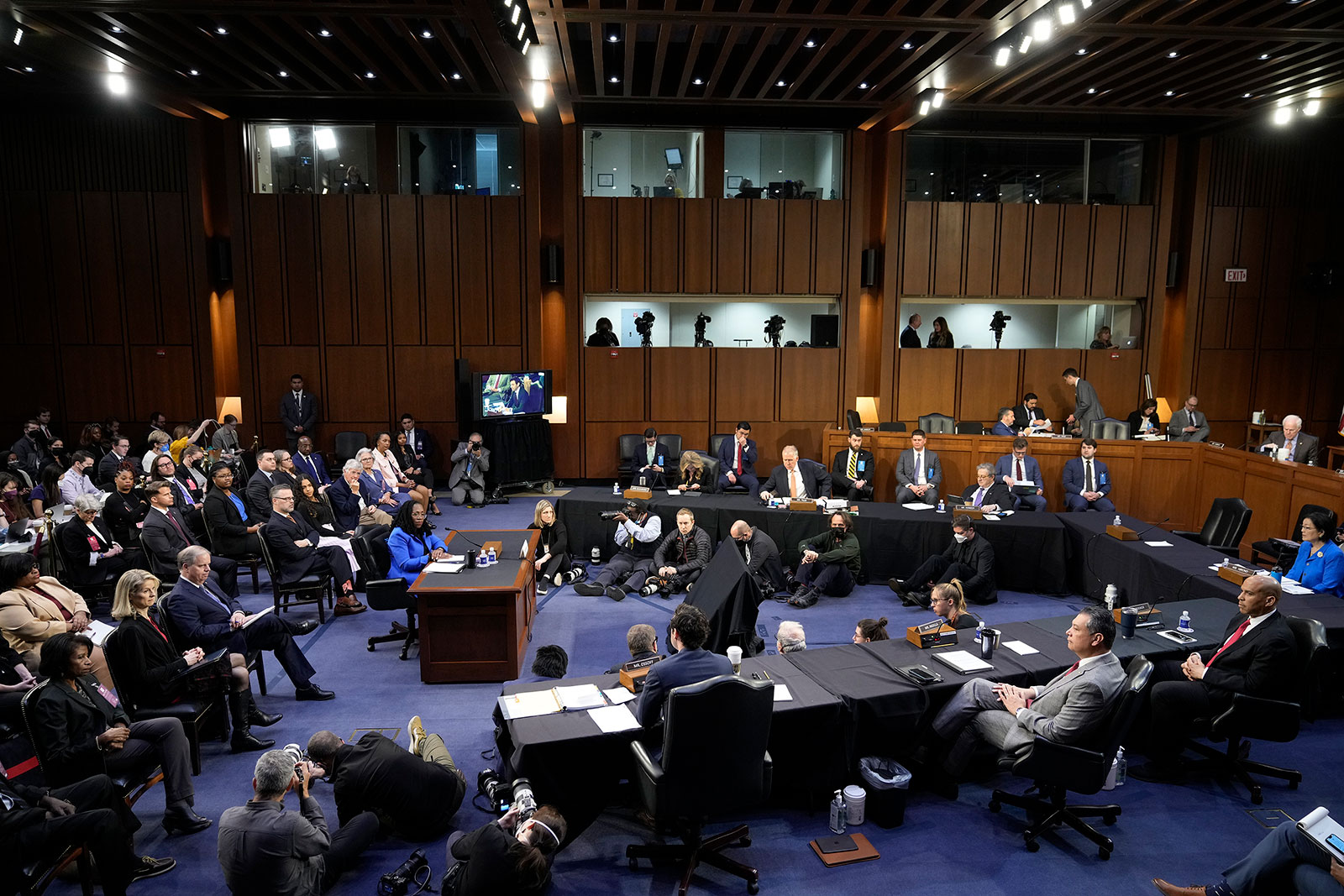
Supreme Court nominee Ketanji Brown Jackson is facing the final day of questioning today and the hearings will wrap up tomorrow when the American Bar Association and outside witnesses deliver testimony.
Once this week’s public hearings wrap, there’s a committee vote on whether to advance the nomination. And then there’s a final Senate floor vote. The date for these votes have not yet been set.
Democrats can confirm Jackson to the high court on the strength of their narrow Senate majority, with 50 votes and Vice President Kamala Harris breaking a tie. The party does not need any Republican support for successful confirmation, but if any Republicans do vote to confirm, it would give the White House a chance to tout a bipartisan confirmation.
It’s not yet clear, however, whether Jackson will receive any votes from Republicans.
When the Senate voted to confirm her last year to fill a vacancy on a powerful DC-based appellate court, three Republican senators voted with Democrats in favor: Sens. Lindsey Graham of South Carolina, Susan Collins of Maine and Lisa Murkowski of Alaska.
How long does it take to confirm a Supreme Court justice? The confirmation process timeline varies. For instance, with the 2020 election bearing down and the likelihood they would lose control of the Senate, Republicans pushed through Amy Coney Barrett’s nomination in lightning speed — less than a month. Before that, the last nomination to proceed to confirmation in less than two months was Ruth Bader Ginsburg’s back in 1993. These things usually take months.
Democrats say they hope to confirm Jackson by early April.
Read more about the Supreme Court confirmation process here.
CNN’s Zachary B. Wolf, Clare Foran and Alex Rogers contributed reporting to this post.
Responding to GOP suggestion of too much “empathy,” Jackson says her comments to defendants were about “public safety”
From CNN’s Tierney Sneed
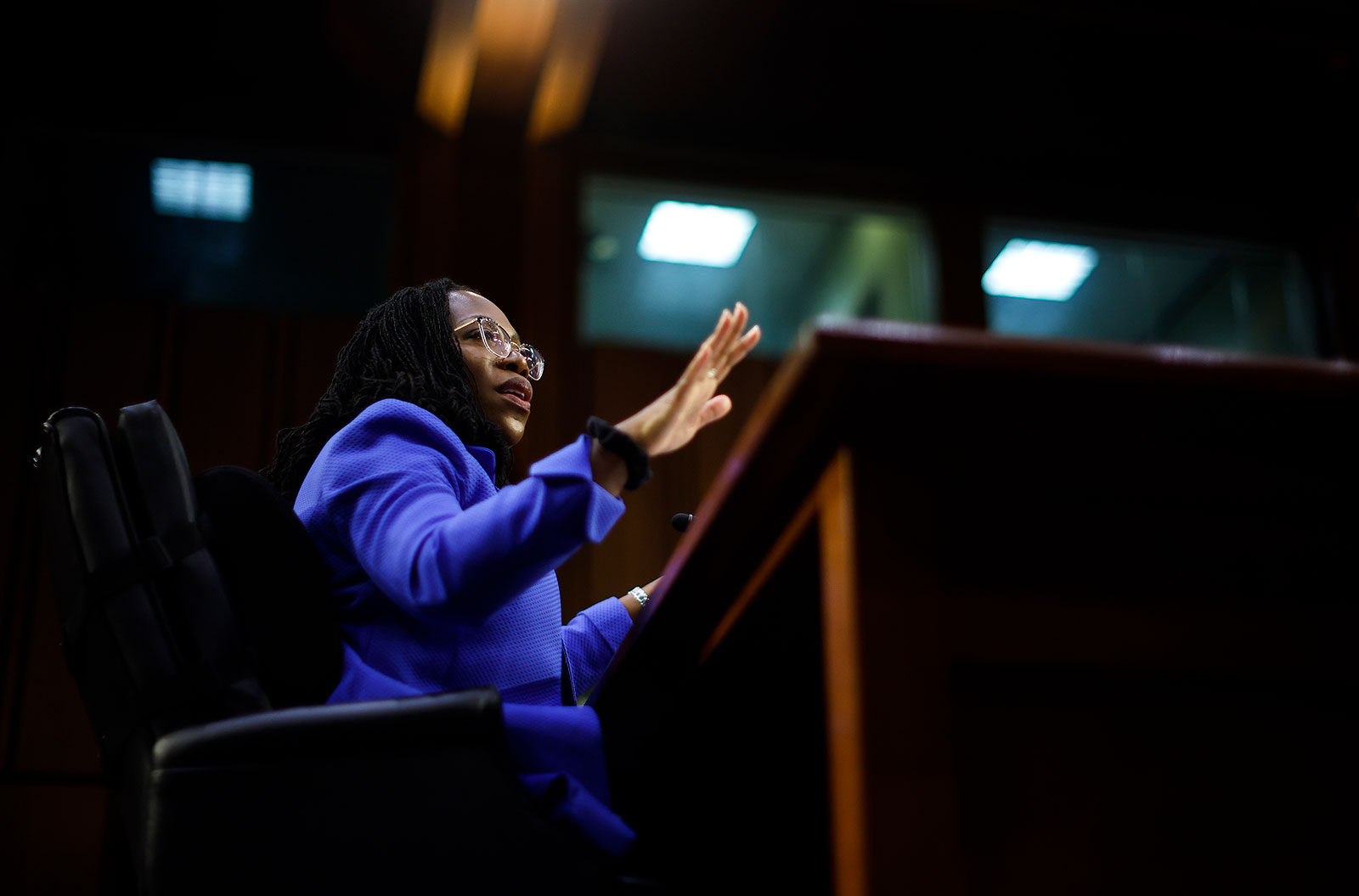
Judge Ketanji Brown Jackson explained the way she spoke to defendants as a trial judge during sentencing, as she faces Republicans who have raised concerns about the “empathy” she has shown on the bench.
“My attempts to communicate directly with defendants is about public safety, because most of the people who are incarcerated — via the federal system and even via the state system — will come out, will be a part of our communities again,” Jackson said in response to a question from Sen. Thom Tillis, a Republican from North Carolina. “And so it is to our entire benefit, as Congress has recognized to ensure that people who come out stop committing crimes.”
Jackson testified that when she was sentencing people to very long sentences, she sought to convey to the defendant that “you have to go away understanding that I am imposing consequences for your decision, your decision to engage in criminal behavior.”
She said that, as a public defender, she recognized that there were lots of defendants who didn’t take responsibility for their crimes, because “they were bitter, they were angry, they were feeling victimized because they didn’t get a chance to say what they wanted to say, because nobody explained to them that drug crimes are really serious crimes. Nobody said to them, ‘Do you understand that there are children who will never have normal lives because you sold crack to their parents, and now they’re in a vortex of addiction. Do you understand that Mr. Defendant?’” Jackson said.
“I was the one in my sentencing practices who explained to those things in an interest of furthering Congress’s direction, that we’re supposed to be sentencing people so that they can ultimately be rehabilitated to the benefit of society as a whole,” the judge said.
Jackson says brother’s police work helped her understand “need for law enforcement”
From CNN’s Tierney Sneed
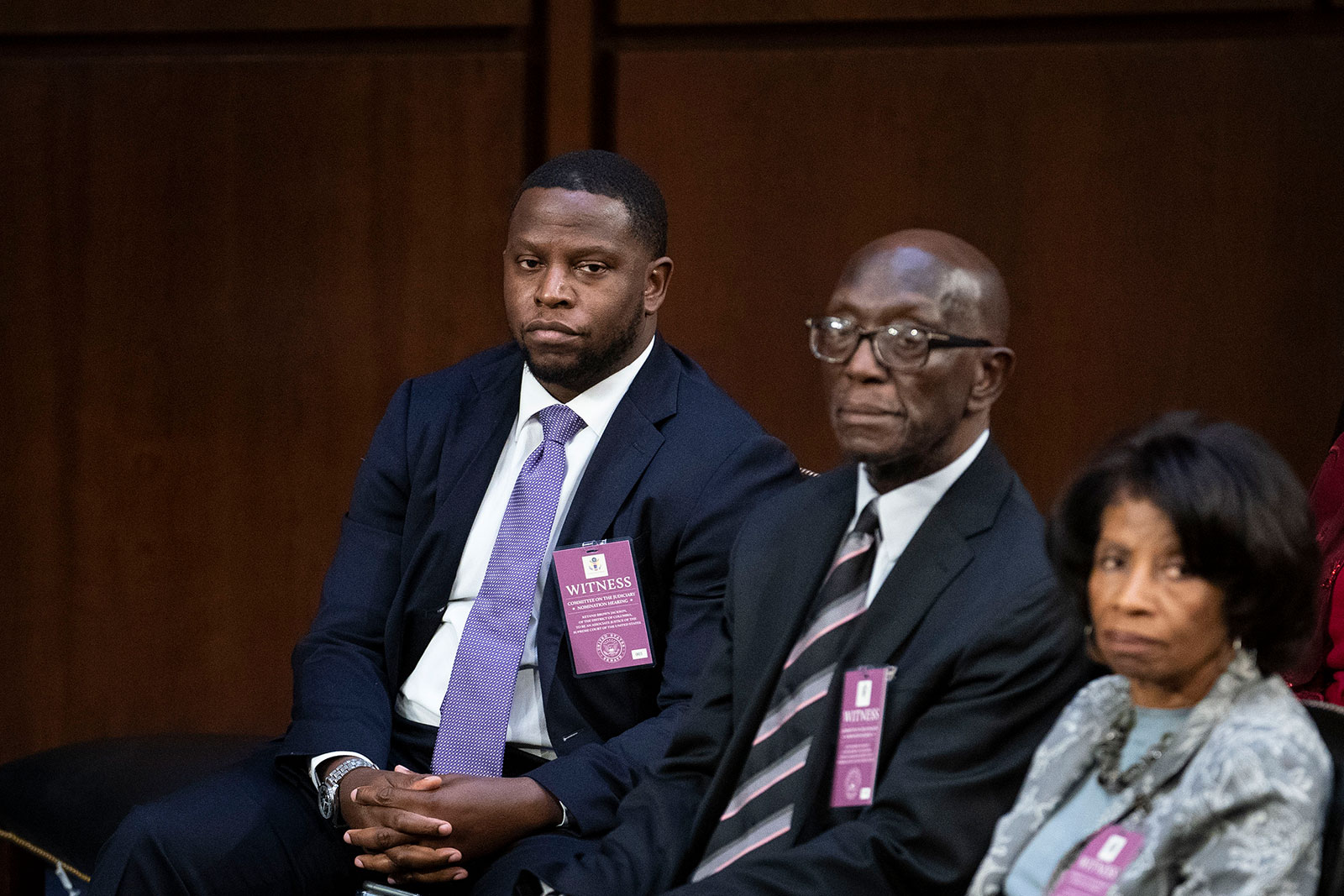
Judge Ketanji Brown Jackson connected her brother’s service in law enforcement and the military to her own views about the law.
“I understand the need for law enforcement, the importance of having people who are willing to do that important work, the importance of holding people accountable for their criminal behavior,” she said. “I also as a lawyer and a citizen, believe very strongly in our Constitution, and the rights that make us free.”
Responding to a question from Georgia Democratic Sen. Jon Ossoff, Jackson recounted how her brother Ketajh – who is about a decade younger than the judge — became a police officer in Baltimore after graduating from Howard University, and how that was a “very stressful period for us as a family.”
“As proud as we are of his service, as much as we know it’s important, law enforcement is a dangerous profession,” she said. “As family members, you worry when you don’t get the phone call, when you haven’t heard for a couple of days, when you hear about things in the news in the community.”
After the September 11, 2001, terrorist attacks, her brother joined the military. She recounted how he told her that he was choosing to be “boots on the ground” in the infantry, because, he said, in her account, “If I’m going to be leading, I’m going to be out front.”
She compared her brother’s public service to her own work as a lawyer at a time, when she was helping courts “figure out the limits of executive authority consistent with what the framers have told us is important.” She said that work was based in an “understanding that to defend our country and its values, we also needed to make sure that, when we responded as a country to the terrible attacks on 9/11, we were upholding our constitutional values, that we weren’t allowing the terrorists to win by changing who we are.”
“I worked to protect our country. My brother worked on the frontlines, and it was all because public service is important to us,” she added.
Read more about Jackson’s family:
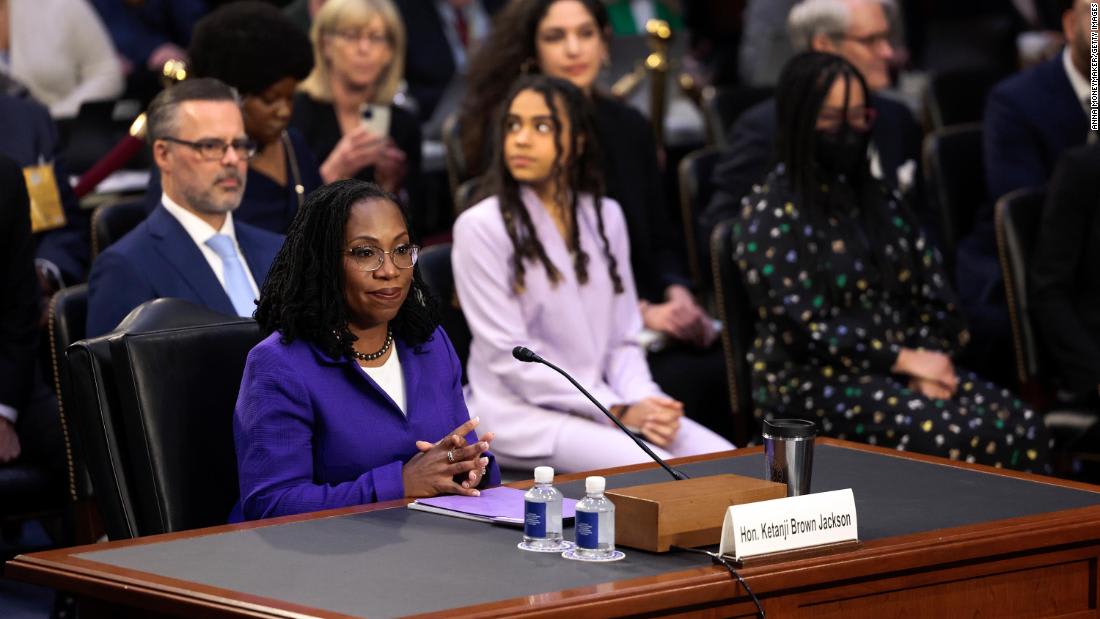
NOW: The third day of Jackson’s confirmation hearings begins
From CNN’s Clare Foran
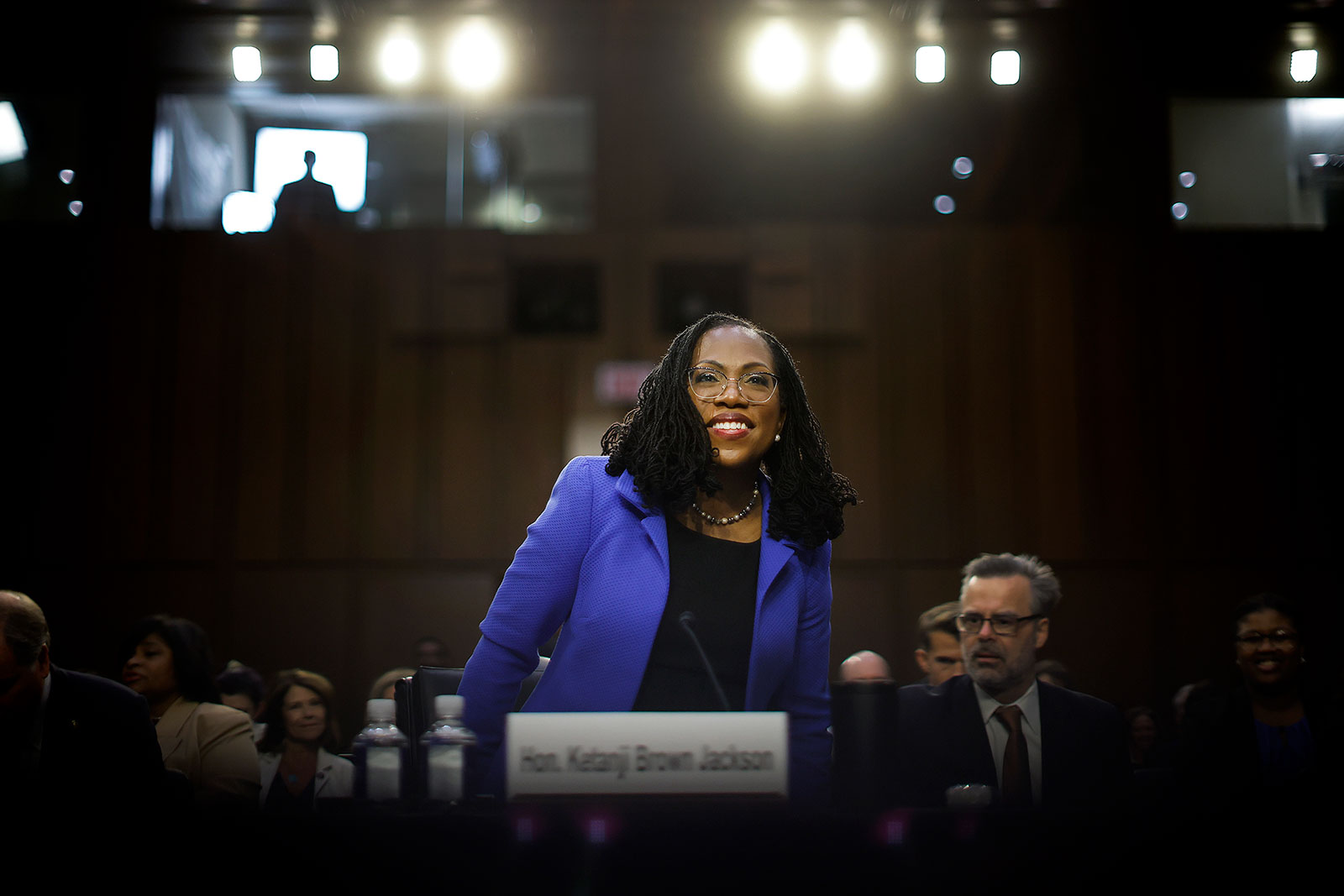
President Biden’s Supreme Court nominee, Ketanji Brown Jackson, is facing another round of questions from lawmakers on the Senate Judiciary Committee during the third day of her historic confirmation hearings and final day of questioning.
Two senators from the panel —Democrat Jon Ossoff of Georgia and Republican Thom Tillis of North Carolina — will have 30 minutes to ask questions. Following their time, each senator on the panel will be given 20 minutes for additional questions.
“This is a tough assignment, and many have risen to the challenge but none as well as you did yesterday. Thank you for doing it so much,” committee chair Dick Durbin said as he opened Wednesday’s hearing. “I would say this, much of what we heard from a handful of senators yesterday has to be put in context.”
“The overwhelming majority of senators on both sides, I thought, were asking appropriate questions and positive in their approach and respectful of the nominee before us. But for many senators yesterday was an opportunity to showcase talking points for the November election. For example, all Democrats are soft on crime, therefore this nominee must be soft on crime. Well, you’ve made a mess of their stereotype,” he continued.
What happened yesterday: Tuesday featured a marathon first round of questioning that stretched late into the evening as Republicans grilled Jackson on her judicial philosophy, her legal record and past defense work, and support for her nomination from left-wing groups.
Jackson defended her record amid sharp questioning from Republican senators. She refuted claims from Republicans that she is weak on crime by stressing her concern for public safety and the rule of law, both as a judge and an American.
“Crime, and the effects on the community, and the need for law enforcement — those are not abstract concepts or political slogans to me,” she said.
She responded to concerns raised by Republicans over the potential for judicial activism by arguing that she approaches her work in an impartial way and emphasizing that it would be inappropriate to impose any kind of personal opinion or policy preference.
“When I get a case, I ensure that I am proceeding from a position of neutrality,” she said.
Jackson also discussed elements of her tenure in the legal profession that have attracted particular scrutiny —and criticism — from Republicans.
Describing her work as a public defender, Jackson said, “I was in the federal public defender’s office right after the Supreme Court decided that individuals who were detained at Guantanamo Bay by the President could seek review of their detention.”
She added, “Federal public defenders don’t get to pick their clients. They have to represent whoever comes in and it’s a service. That’s what you do as a federal public defender, you are standing up for the constitutional value of representation.”
Jackson also forcefully rebutted concerns voiced by some GOP senators over her record on sentencing in child pornography cases, referring to the issue as a “sickening and egregious crime.”
You will likely hear Jackson be asked about her judicial philosophy again today. Here’s what that means.
From CNN’s Tierney Sneed
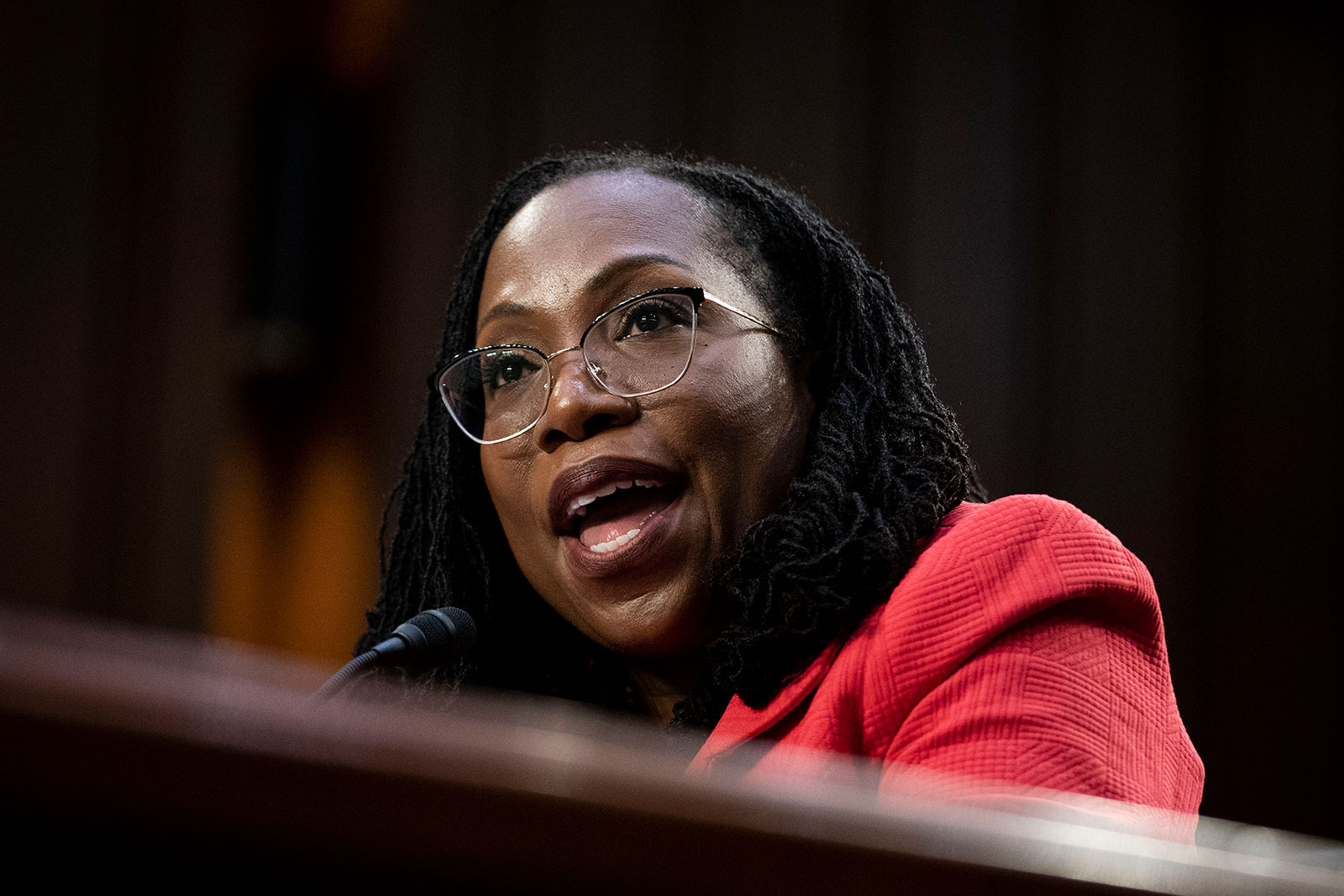
Facing GOP skepticism for not aligning herself with a specific judicial philosophy in Tuesday’s hearing, Ketanji Brown Jackson gave new details about the way she approaches her job and the “methodology” she uses for deciding a case.
“I am acutely aware that as a judge in our system I have limited power and I am trying in every case to stay in my lane,” she said.
The three-step process she described involved clearing her mind of any preconceived notions about the case, receiving the various inputs — the written briefs, the factual record, the hearings — she’ll need to decide a case, and embarking on an interpretation of the law that hews to “the constraints” on her role as a judge.
She said she was trying to “to figure out what the words mean as they were intended by the people who wrote them.”
This description of her methodology was not enough to satisfy Republican questions about her judicial philosophy.
But what does this term mean? It refers to the type of framework a judge uses to analyze a case of constitutional interpretation. An originalist approach, which is favored by conservatives, seeks to interpret the Constitution by how the framers would have understood the words at the time they were drafted.
Some progressives have sought to chart what has been called a “Living Constitution” approach, which seeks to interpret the general principles in the Constitution in a way that is applicable to contemporary circumstances.
Even as she answered Nebraska Republican Sen. Ben Sasse’s questions about the dueling approaches, Jackson declined to explicitly align herself with one or the other, noting that constitutional interpretation did not come up every often in the cases she was deciding as a lower court judge.
58% of Americans say the Senate should vote in favor of Jackson’s historical nomination, Gallup Poll shows
From CNN’s Shawna Mizelle

A majority of Americans support Judge Ketanji Brown Jackson being confirmed to the Supreme Court, with 58% saying the Senate should vote in favor of her historical nomination to the nation’s highest court, according to a poll newly released by Gallup.
The poll, which was taken in the weeks ahead of Jackson’s confirmation hearings, shows that 30% of those polled said the Senate should not vote in favor of confirming her; an additional 12% had no opinion.
“Jackson’s support is thus 10 percentage points above the historical norm, while the percentage without an opinion is 11 points lower,” the Gallup article said.
The poll was released Wednesday morning as the Senate Judiciary Committee continues to hold confirmation hearings for Jackson.
Democrats, Gallup found, overwhelmingly favored Jackson’s confirmation, while a smaller majority of Republicans were against it. Eighty-eight percent of Democrats supported Jackson and 55% of Republicans were opposed.
The only other Supreme Court nominee to garner a similar approval rating in Gallup’s polling — which the report says dates back to 1987, with Douglas Ginsburg, Anthony Kennedy, David Souter and Stephen Breyer the exceptions — was Chief Justice John Roberts in 2005. He garnered the support of 59% of Americans, essentially tying with Jackson for the highest approval rating, according to Gallup.
These are the senators on the Judiciary Committee that will continue to question Jackson today
Members of the Senate Judiciary Committee will continue to question Judge Ketanji Brown Jackson today.
The 22-member panel, which is divided evenly between Democrats and Republicans, will vote on Jackson’s nomination before moving to the full 100-member Senate.
The third day of confirmation hearings will start at 9 a.m. ET today and the remaining two senators from the panel — Democrat Jon Ossoff of Georgia and GOP Thom Tillis of North Carolina — will have 30 minutes to ask questions.
Then, committee members will be given 20 minutes each for a second round of questioning.
Source: https://www.cnn.com/politics/live-news/ketanji-brown-jackson-hearing-3-23-22/h_5a38c7a2df8da4a893284949cbf545af

















